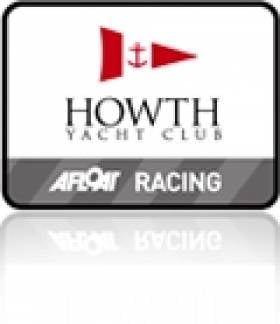Displaying items by tag: 6race series
Fine Day for Howth Yacht Club Spring Warmer Finale
FINE DAY FOR SPRING WARMER FINALE
Howth Yacht Club's Spring Warmer Sailing Series, sponsored by Key Capital Private, came to a close on Saturday afternoon after the eight classes completed the six-race series in conditions which, while pleasant, were particularly frustrating for the race officers. With the winds shifting from northerly to easterly as the day wore on, it was no surprise that the starts for both races were delayed until conditions settled.
In terms of numbers, the SB3s had the biggest entry with 17, with a dozen or so out each week. Sharkbait (Duncan/Moran) and Yeti (Sean Craig, RStGYC) dominated proceedings on the last day, notching 1st and 2nd respectively in both races. While that was no doubt satisfying, it wasn’t enough to prevent the consistent Eoin Quinlan in ‘Shockwave’ from taking the overall prize.
The Quinn/O’Flaherty partnership in Fetching has been the crew to beat in the Etchells from day one and while Kootamundra Wattle and Jabberwocky took turns to win on the last day, two second places was more than enough for Fetching to head the fleet overall. That their discard was a second place speaks volumes for their dominance.
Class 1 was a three-boat affair but it was Storm (Pat Kelly) who headed Equinox (Ross McDonald) with two wins to take the overall honours by two points on IRC, although the order was reversed under ECHO.
Xtra Time (M&P Arthurs, MYC) enjoyed success in the first race but it was never going to be enough to upset the odds on Maximus (Pat Kyne) winning the Class 2 trophy on IRC, with the Howth boat also winning on ECHO as well.
Over on the ‘inshore course’, Class 2 was effectively a match-race between two boats – Gecko and Starlet – who took it in turns to win the races so that in the end they couldn’t be separated and had to share the spoils.
Lough Erne visitor JP McCaldin got away well to win the first race and with two guns and two seconds over the first two weekends had the luxury of retiring from the final race knowing that the series was wrapped up. Scandal from MYC (with Mossy Shanahan on helm) won well in the last race to share second overall with Flor O’Driscoll’s Hard On Port.
The only perfect score of the series was in the Puppeteers where Dave Clarke’s Harlequin topped the fleet with a peerless six guns and the margin of victory was such that they also won on handicap. Eclipse (A & R Hegarty) had a satisfactory series, finishing runner-up on both scratch and handicap.
Visiting boats dominated the Squibs from day one and while Royal North entry Toy for the Boys (P.Wallace) won the penultimate race, normal service was resumed with Lola (F.Whelan, RStGYC) in the last, to take the title by a clear four points from another George boat Nimble (O’Hare & others).





























































